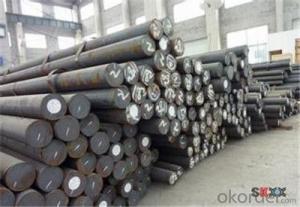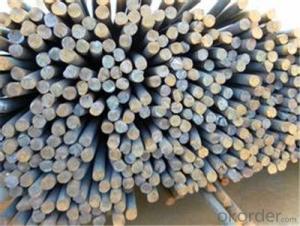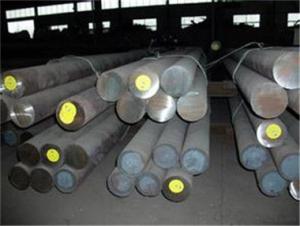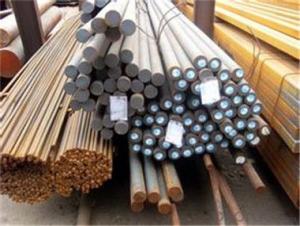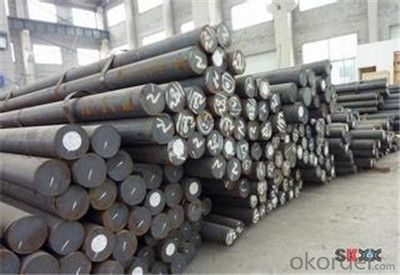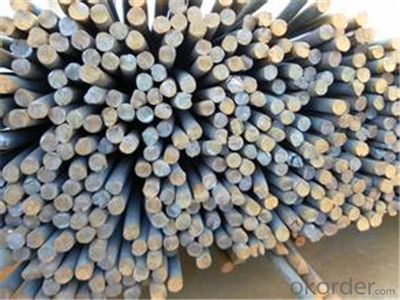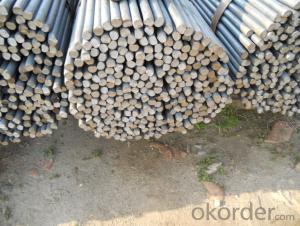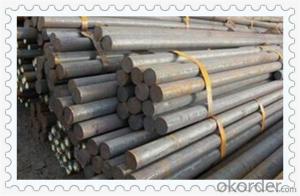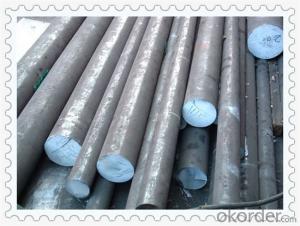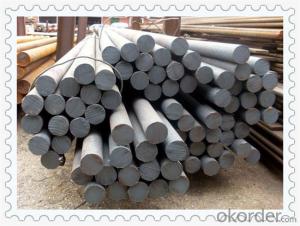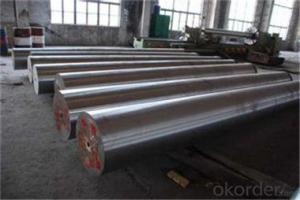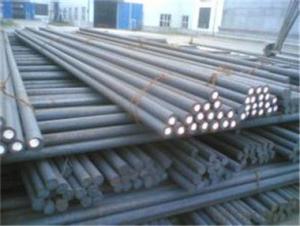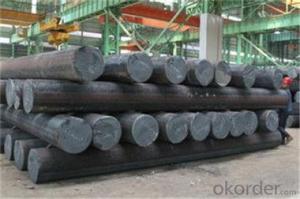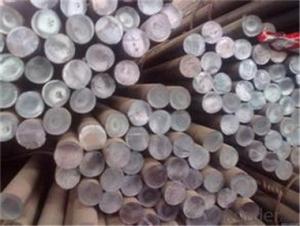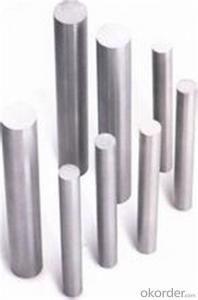Steel Round Bar Reliable Manufacturer with from China
- Loading Port:
- Tianjin
- Payment Terms:
- TT OR LC
- Min Order Qty:
- 100 m.t.
- Supply Capability:
- 2000000 m.t./month
OKorder Service Pledge
OKorder Financial Service
You Might Also Like
Description of steel round bar:
1. Commodity: Round steel bar
3. Technical: Hot rolling
2. Length: Min. 5.8meter, according to requirement.
3. Diameter: 16mm-250mm
5. Packing: In Bundle or according to your requirements.
Festures of steel round bar:
1.Dia 80-800mm Length:2000-13000mm or as required
2.Technique:Forged
3.Delivery Time:45 days
Specifications of steel round bar:
1. Standards: AISI 4340 8620 8640 4320 , JIS SNCM8 GB:40CrNiMoA
2. Specification: Dia: 80~450mm Length:2000-13000mm or as required
3. Process: EAF+LF+VD ( necessary) UT+ Peeled +Turned + Heat Treatment (optional)
4. Chemical Composition (%):
C | Si | Mn | S | P | Cr | Ni | Cu | Mo |
0.37-0.44 | 0.17-0.37 | 0.40-0.80 | 0.025(max) | 0.025(max) | 0.60-0.90 | 1.25-1.65 | 0.025(max) | 0.15-0.25 |
Images of steel round bar:
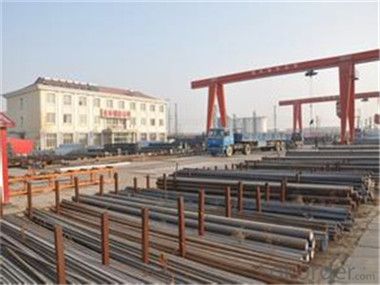
FAQ:
1. What is your package?
Packing situation: standard seaworthy packing or as customer required.
2. How long is the lead time?
Delivery time: 45 days after order confirmed.
3. What payment term do you accept?
Payment: T/T or L/C at sight.
- Q: Can steel round bars be used in the automotive manufacturing?
- Yes, steel round bars can be used in automotive manufacturing. Steel round bars offer high strength and durability, making them suitable for various automotive components such as crankshafts, camshafts, axles, and suspension parts. They also provide excellent machinability and can be easily fabricated into the required shapes and sizes, making them a preferred choice in the automotive industry.
- Q: What is the fatigue strength of a steel round bar?
- The fatigue strength of a steel round bar refers to its ability to withstand repeated loading and unloading cycles without experiencing failure. It is a measure of the maximum stress that the bar can endure without developing cracks or fractures due to fatigue. The fatigue strength of a steel round bar depends on various factors such as the material composition, surface condition, size, and manufacturing process.
- Q: What is the difference between a peeled and a polished steel round bar?
- Two distinct types of steel bars are the peeled steel round bar and the polished steel round bar, each with unique characteristics and applications. The peeled steel round bar is obtained through a peeling process, which involves the removal of the outer surface of the bar. This results in a smooth and clean finish, eliminating any imperfections or scale. The peeled steel round bar is highly suitable for applications requiring a smooth surface, such as the manufacturing of precision components, shafts, or spindles. The peeling process also enhances the mechanical properties of the bar, improving its strength and toughness. In contrast, the polished steel round bar undergoes a polishing process to achieve a shiny and reflective surface. This process utilizes abrasive materials to eliminate surface imperfections, scratches, or dullness. As a result, the polished steel round bar is often employed in decorative applications, architectural designs, or industries that prioritize visually appealing finishes, such as furniture manufacturing or automotive accessories. To summarize, the primary distinction between the peeled and polished steel round bar lies in their respective processes and intended uses. The peeled steel round bar is processed to eliminate imperfections and enhance mechanical properties, making it suitable for precision components. Conversely, the polished steel round bar is processed to create a shiny and reflective surface, making it ideal for decorative or visually appealing applications.
- Q: Can steel round bars be used for making railway tracks?
- Making railway tracks is possible using steel round bars. They are commonly chosen as the main material for railway tracks due to their strength, durability, and capacity to handle heavy loads. These bars offer a stable and solid base for train travel and can endure the continuous wear and tear caused by train wheels. The circular shape of the bars also aids in reducing friction and enabling smooth train movement. Moreover, steel is resistant to rust, which makes it appropriate for long-lasting outdoor applications like railway tracks. In conclusion, steel round bars are a favored option for creating railway tracks because of their strength, durability, and dependability.
- Q: How is the copper wire and galvanized round steel connected during the construction of the lightning protection device?
- Generally, the lightning protection devices of buildings are divided into two major categories: external lightning protection devices and internal lightning protection devices. The external lightning protection device consists of a lightning receiver, a lead off line and a grounding device, namely the traditional lightning protection device. Internal lightning protection device is mainly used to reduce the lightning current inside the building and electromagnetic effects, such as the use of electromagnetic shielding, equipotential connection and installation of surge protection device (SPD) and other measures to prevent the harm caused by lightning electromagnetic pulse.
- Q: Can steel round bars be used for making rebar?
- No, steel round bars cannot be used for making rebar. Rebar, or reinforcing bar, is specifically designed and manufactured with deformations or ribs on its surface to enhance the bond with concrete. These deformations provide better grip and prevent slippage between the rebar and concrete, thus improving the structural integrity of a reinforced concrete structure. On the other hand, steel round bars have a smooth surface and lack the necessary deformations, making them unsuitable for rebar applications. It is important to use rebar that meets the required standards and specifications to ensure the safety and durability of the concrete structure.
- Q: Can steel round bars be used for making suspension springs?
- Yes, steel round bars can be used for making suspension springs. Steel is a common material choice for suspension springs due to its strength, durability, and ability to withstand high loads and vibrations. Steel round bars can be readily shaped, tempered, and heat-treated to meet the specific requirements of suspension springs, providing necessary flexibility and resilience.
- Q: What is the composition of steel round bars?
- Steel round bars primarily consist of iron and carbon, along with small amounts of other elements like manganese, silicon, sulfur, and phosphorus. The primary element, iron, provides the steel bar with strength and structural integrity. The carbon content is vital in determining the bar's hardness and strength, where higher carbon levels result in a harder and stronger material. Manganese contributes to the overall strength and toughness of the steel, while silicon aids in enhancing its resistance to oxidation and scaling at high temperatures. Sulfur and phosphorus, considered impurities, are kept at low levels to prevent any negative impact on the mechanical properties of the material. In summary, the composition of steel round bars is meticulously controlled to achieve the desired strength, durability, and specific properties required for different applications.
- Q: How many tons of pressure can the round steel of 70 inches bear?
- As the diameter of about 11.5 cm diameter 180 cm long in the middle of the force which kind of force will be smaller if the curvature is hollow capability hollow wall thickness to achieve much greater strength than solid to do not understand what the best please say a little more thank you good answer is a plus
- Q: What are the different types of steel round bar shapes?
- There are several different types of steel round bar shapes available, each with its own unique characteristics and applications. Some common types include: 1. Round: This is the most basic and widely used shape for steel round bars. It is cylindrical in shape and is used in a variety of industries, including construction, manufacturing, and automotive. 2. Square: Square steel round bars have four equal sides and are often used in applications where a strong, sturdy shape is required. They are commonly used in construction, architectural designs, and machinery. 3. Hexagonal: Hexagonal steel round bars have six sides, giving them a unique shape. They are often used in applications where high strength and resistance to corrosion are required. Hexagonal bars are commonly used in industries such as aerospace, defense, and oil and gas. 4. Flat: Flat steel round bars have a rectangular cross-section with a flat top and bottom surface. They are often used in applications where a wide, flat surface is required, such as construction, machinery, and manufacturing. 5. Half Round: Half-round steel round bars have a semicircular shape with a flat bottom surface. They are commonly used in applications such as handrails, fencing, and decorative purposes. 6. D-shaped: D-shaped steel round bars have a flat bottom surface and a curved top surface, resembling the letter "D". They are often used in applications where a strong, yet lightweight shape is required, such as automotive frames and chassis. These are just a few examples of the different types of steel round bar shapes available. The choice of shape depends on the specific requirements of the application, including strength, durability, corrosion resistance, and aesthetic appeal.
Send your message to us
Steel Round Bar Reliable Manufacturer with from China
- Loading Port:
- Tianjin
- Payment Terms:
- TT OR LC
- Min Order Qty:
- 100 m.t.
- Supply Capability:
- 2000000 m.t./month
OKorder Service Pledge
OKorder Financial Service
Similar products
Hot products
Hot Searches
Related keywords
